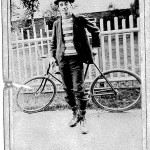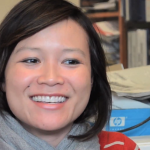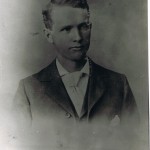It’s Sunday, Oct. 23, my first day off from the Twain trip. I’m spending it in Scituate, Mass., with my wife, Nancy; younger daughter, Laura; son-in-law Mike MacMillan; and their three children.
Infant Joy (who is a joy), 3-year-old Matthew and Emily are celebrating Emily’s 4-and-a-half-year birthday with special fudge swirl ice cream and six toppings (to take a photo of Matthew and Emily in their Twain trip T-shirts required first scrubbing their cheeks and chin clean of fudge swirl layers).
I also visit my 93-year-old mother, Rae Whitney Ghiglione, who has been living in a second-floor studio apartment at Sunrise, a Cohasset, Mass., nursing facility, for 15 months. She has adjusted well to what could have been a traumatic change.
Following my father’s death in 1966, she spent 44 years living alone, most of it in a tiny Sherman Oaks, Calif., house with an assortment of animal-shelter mutts. But on April 6, 2010, she was found by a housekeeper after surviving two days on her kitchen floor. She was barely conscious.
Then came three months of hospitalization and physical therapy. She moved cross-country to Sunrise and, with the aid of a walker, immediately joined in all activities, from morning exercise classes to field trips to church services to drawing classes to nightly movies.
She has meals at a table of eight—seven women and one man—known for laughing loudly and staying late. From her days as a TV singer and her beauty, she has gained the nickname “glamour girl.”
But there are reminders of mortality. An aide gives her 13 pills each morning and evening. Occasional falls require visits to a nearby hospital. The latest occurred when she bent over to pet Harley, Sunrise’s somnolent, sad-eyed pooch, and broke her neck.
Doctors did not recommend surgery because of her age. So, after knocking on her apartment door, I find her napping on her bed, flat on her back, her neck immobilized by a 4-inch-wide, black-and-white brace.
Sensing my sadness at seeing her in the brace she explains how she is adjusting. She describes an easel-like contraption that allows her to continue to play bingo. “It works fine,” she says.
She remains philosophical about her condition, including memory loss. She endures the neck brace without complaint. “No point,” she says, “in doing anything else.” When she thinks she hears me address an aide by the wrong name, she laughs, “No name is the wrong name around here.”
Loren Ghiglione

























